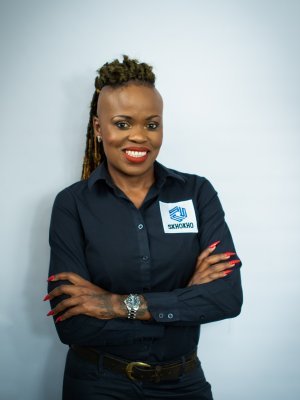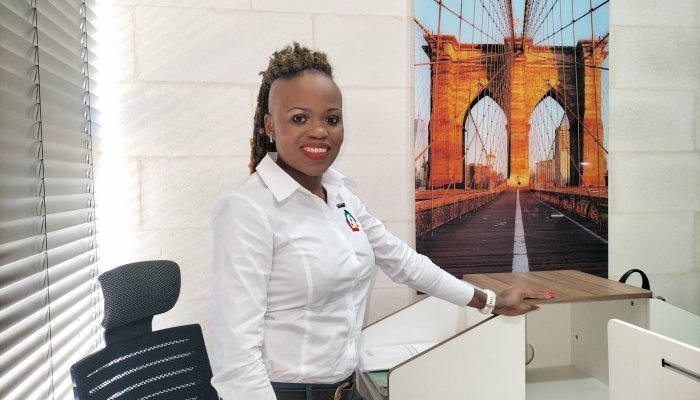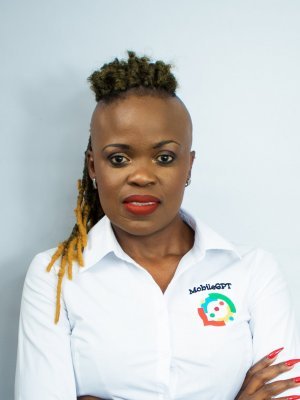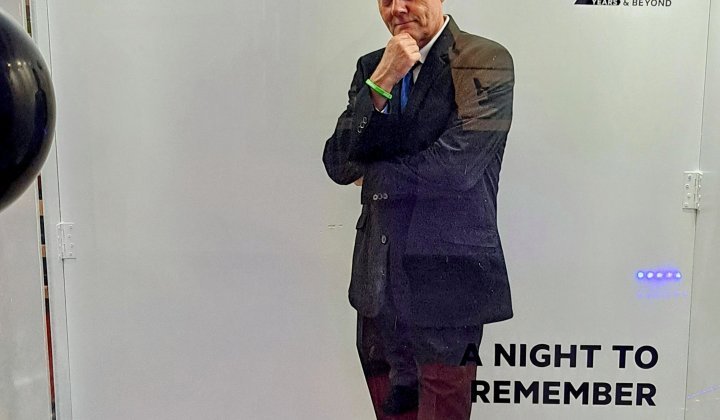With her newly launched product, MobileGPT, software engineer Bertha Kgokong is associated with one of the most-discussed AI apps in the world, ChatGPT. The smartphone-based chatbot product she created has positioned Kgokong at the forefront of the technological revolution.
But she hasn’t always been up to date with global conventions. Ngwanamala Secondary, the high school she attended in Limpopo, consisted of just nine classrooms for all grades. Many of Kgokong’s lessons were held in tents and at times even under the dappled shade of trees.
Even though she didn’t have a personal computer, unlimited WiFi, or a private tutor, she went on to pass matric and qualify for a BSc in Chemical Engineering at the University of Cape Town.
While studying, necessity led Kgokong onto what she now sees as her first foray into entrepreneurship. “The first business I worked on was actually in university, when I braided people’s hair. I started because I needed the extra cash. All my father could afford was to get me to Cape Town. I had a bus ticket and R300, and after that I was on my own. Due to my demanding academic schedule, the appointments I made were far apart. However, I could get R400 at a time, and that went a long way in UCT.”
From those humble beginnings, Kgokong has come a long way as an entrepreneur.
Starting, learning, pivoting
After graduating, Kgokong embarked on a corporate career in which she worked as a process engineer for companies such as Sasol Technology, Fluor Daniel and Tongaat Hulett. Right at the early days of employment, she started a side gig, planning to juggle a day job and a business after-hours. The demands of both were high. “It was a bad idea and I messed up at work and at the side business.”
Engineering became a primary focus over the next couple of years until the entrepreneurial call became impossible to ignore. Kgokong cleared debt, saved money, devised a plan. When she resigned, the intention was to do a cryptocurrency exchange in partnership with some friends. They anticipated being cash positive within six months. However, by the following year it was evident that the business was crashing.
The company now known as Tati Software was actually a pivot from this failed venture.
Seeing that the business was struggling, Kgokong started teaching herself programming and coding. Initially, this was to see how these skills could potentially solve some of the challenges she faced. “I taught myself how to code so I could build my own products, but in the process, I learned I could make money doing this for other people too. I realised there are many people out there who need someone to code and build a product for them.”
From this experience, Kgokong learnt that reality is different to a vision, no matter how meticulously planned it may be. “Thinking about entrepreneurship and planning a business is like preparing for a marathon. You can plan it down to every kilometre, but when you start running, things get real. You have to go through every kilometre with your own legs; even when fatigue sets in, cramps happen and the road is hard. Being in it is a whole different experience to dreaming or planning for it.”
Redefining, overcoming, growing
Learning to code and trusting her assessment that there would be people in need of her services gave Kgokong courage to continue with Tati Software during the taxing early days. It would take three years from when she resigned to when the business was able to generate adequate revenue from building software products for clients. The learning curve was steep and tested her resolve on all fronts.
One of the major adjustments was that of owning her own time and being responsible for her own outputs. “This transition was a challenge. As an employee, I came from a place of structure. There was a boss who tells you what to do, a performance management system that keeps you accountable and systems that create structure. In entrepreneurship, none of that was there. I had to make it without a boss, existing processes, and standard procedures and guidelines. The mental shift was hard!”
There were days when it was easier to just do nothing or choose tasks that seemed less demanding. It would take some time before Kgokong learned to self-motivate and create her own structure and systems. Bills that kept on coming were a form of external motivation that couldn’t be ignored! “Failure was not an option, even though I almost quit so many times. If someone had offered me a job then, I might have taken it.”
When she could barely afford enough food, and didn’t have money for rent, Kgokong was tempted to quit. Instead of sleeping on couches, she could go back to employment and being able to afford necessities. But she refused to give up.
“I was convinced that if I stuck it out long enough, success was guaranteed.”
The business idea was solving a problem, clients were prepared to pay for her solutions and income was starting to flow. But Kgokong faced another challenge – being a black woman in tech. She’d experienced prejudice and doubt in her career as a female engineer. But this heightened as a software developer when she’d get critical feedback that included comments such as, “You don’t look like a tech founder.”
One of the most startling exchanges was when a potential investor expressed doubt over her intentions to disrupt an entire industry when they knew many smart people who were working hard to disrupt just a small section of the industry. This interaction sparked self-doubt that Kgokong had to work hard to conquer.
Persevering, succeeding, supporting
Fortunately, Kgokong could also balance the opinions of doubters and detractors with tangible feedback, such as when the company won a GovTech Award for the first ever product they built. Sticking through the trying times was the right decision as in the past few years, Tati Software has accrued an enviable client list that includes the Mining Investment Corporation, Telkom and Sanlam.
It’s also allowed Kgokong to settle into and get to relish the advantages of being a business owner. “I love the freedom to own my time. As a female founder, I am also a mother. It's a joy to be able to take my child to school and pick her up every day. I can work in the evening and do something else with my day. Buying back my time is the best benefit of being an entrepreneur.”
Additionally, now that the company is flourishing and doesn’t need as much direct input from Kgokong, she can take on passion projects. “I love the freedom to work on projects that are close to my heart. Starting Skolo, an online learning school, is just such an example. I would have never been able to do that, had I still been in corporate.”
As a GIBS MBA graduate, Kgokong has also been able to dedicate time to the GIBS Alumni Business Club (ABC), first serving as public relations officer and then, since 2020, as president. Being involved with and then leading ABC has enabled Kgokong to play her part in supporting entrepreneurs and business owners among GIBS alumni. The club aims to provide non-financial support and opportunities for former students to grow their businesses, make connections and network within alumni.
Kgokong can impart much advice and inspiration because she’s been through the trenches and persevered. She credits one of the big reasons behind her success to being an outsider.
“When it comes to building custom software solutions, specifically things you cannot buy off the shelf, I am good because I am not really a software developer. I am an engineer who can code, so I bring my engineering practices such as problem solving, theory of constraints and results-based thinking to building software. My methods are perhaps unconventional, because I didn’t spend any time working in a development house, so I never learned how to develop properly. I simply look at the problem, and work on a solution and more importantly, how to get to that solution as efficiently as possible.”
It’s this approach that led to the creation of Tati Software’s newest product, MobileGPT, an intelligent chatbot for WhatsApp that allows smartphone users access to tools such as document templates, AI-created images and personal AI assistants, that are usually limited to desktops.
“I built MobileGPT after realising that WhatsApp is not just a messaging platform, but it's also an application platform. I saw this because I think unconventionally.”
Five lessons from five years
Bertha Kgokong reflects on the choices and learnings that grew Tati Software from start-up to stable and successful.
- Year 1: Things do not always go according to plan. I started teaching myself to code and this became part of a defining pivot.
- Year 2: Cash is king. If you are an entrepreneur, you should only be working on things that are bringing cash through the door. And that might mean you don’t have the luxury to sit in endless training sessions and accelerator programmes. I abandoned workshops, fellowships and programmes in 2019 and decided I needed to be making money.
- Year 3: Grow income by focusing on high-value, high-return activities. This was when I realised that perhaps ecommerce was not the end goal for Tati. I started doing the custom software development projects other developers might not touch and took on projects that required extra innovation and ingenuity.
- Year 4: Be the best at what you do and always over-deliver. This commitment enabled us to have repeat clients, and we grew through referrals because of our great work.
- Year 5: Diversify. Do not fall into the trap of having all your eggs in one basket, even if it's a good basket. In 2022, we created other products that would be cash generating, such as Skhokho — our business management software.










